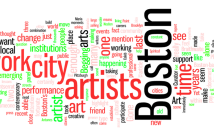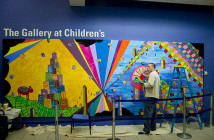I set out across the Atlantic Ocean to visit old England for the first time in my life. I was going to London, and it was the same weekend the (former) Pope died, which ruined my ability to observe British television in a wholly normal state. London’s a lot like Boston, just bigger with comparatively more accents and awkward steering-wheel placement. I was on my way to the Society for Cinema and Media Studies’ first conference outside of North America being held at the Institute of Education of the University of London.
I have a hard time finding my place at academic conferences, as I am not a PhD, and I am not in the process of getting one, as everyone else at the conference seemed to be either of. The idea that I was a poseur interloping on the grounds of the dutifully studious and academically prone sent me back to the 8th grade when I attempted to ingratiate myself into the junior high social class where one would find the most attractive people. This was mostly a failure, but I was not fettered by these memories as my social class of origin in 8th grade seemed quite similar to the one which I found at the conference: the tolerably nerdy, seemingly companionable (when not hiding in an office or book) types who may have introduced you to something like Big RED. But it wasn’t quite so easy. The opening ceremony of the first SCMS conference I attended in 2003, which was also my first academic conference, was described as a “geek posturing” event, not un-like a junior-high school dance with the popular kids holding a rather different cachet of cool. A few hundred relatively a-social people gathered in the sanctuary of academic esoterica, breaking out of their stuffy offices and engaging in varying sorts of hyper-intellectual dialogues and occasional remote jargon-dependent pontifications or awkward mating dances. As I was not associated with any educational institution—unlike 98% of the other conference attendees—I chose the path of the gecko on the wall (though not literally). and attended as many sessions, workshops and screenings as my jet-lagged body would allow me to but struggled to not reveal my non-academic identity.
So why would anybody go to a conference? especially an academic one? Conferences are a great way to see what others are researching, get feedback on your own work, raise awareness of your university or department, network if you’re a student or lowly adjunct professor, plug your new book so other professors at the conference might force their students to buy it, travel on your institution’s money, and for someone like me to meet and learn about departments and people at universities around the globe. I suppose this is a bit like shopping for a proper graduate school and I don’t know why more people don’t do it. Attending a prospective future advisor’s chat and asking them well planned and rehearsed questions is a great way to flatter them and make a colleague; getting into the graduate school of your choice depends greatly on whether your desired advisor wants you hanging around all the time along with whether you’re going to make a good protégé.
This year's conference also had a much more international presence of scholars, which garners SCMS more credibility as an international academic body. There was assumably a greater number of research paper submissions for the conference and so panels could be formed from less disparately themed topics, facilitating and increasing the depth of discussions. One session was given entirely in French. Though, I confess that I am not a veteran of SCMS conferences, academic conferences, or even conferences in general. This year there was a breadth and quality to the panels I have not experienced at an SCMS conference. Relevance can be an issue in much research in any academic field, as many intellectuals lose sight of tangible issues and there curiosity wanes, causing research to be myopic and even more esoteric. It is good that the bad papers are rooted out before the conference begins(as I sometimes wonder if academics have the courage to tell someone they’ve written a bad paper or their that research is as relevant as George Bush’s apparent intellect is to his presidency). Though selection committees for conferences are not always the perfect filters, they should be. A paper was recently submitted to the World Multi-Conference on Systemics, Cybernetics and Informatics by a group of MIT graduate students who created a program that randomly generates Computer Science research papers —demonstrating the risks of taking the use of jargon for granted.
A cursory look (expedited by the ‘Search’ function on Adobe Reader) of the conference’s program can yield a general idea of what SCMS is all about. Sex was mentioned 30 times in the 46 page program in titles of panel discussions or papers being delivered, two of these mentionings were in papers about the show Sex and the City, and 17 times referring more or less to the act. Gender was mentioned 15 times, Race: 20, Identity: 23, Represent[ing/ation] (always a strong and consistently high showing at SCMS conferences): 27 times. Narrative (my personal favorite) was in 22 titles, different forms of the word perform: 27 times, Psychoanalysis and Psychoanalytic: a very disappointing five, Video Games: six, Technology or Technological: 14, and Genre: only 18. Digital was mentioned 32 times (a new fav) but Database only five, and only three papers were specifically about Democracy or Democratization. Experimental and Avant-Garde were mentioned 14, several of these discussed Pat O’Neill’s Decay of Fiction.
Many local colleges represented by their faculty looked studious reading their papers with due emphasis and confidence. Harvard had a respectable showing with three papers delivered. This is an anomaly. Not only was Harvard just there, it beat out all other colleges in the area in the amount of papers delivered. There tends not to be a strong showing at SCMS conferences by the older institutions sometimes known for their patches of rampant ivy growth on campus (though Yale represented six papers at the conference). More well known and established Media and Cinema Studies departments tend to exist at younger schools where interdisciplinary studies were welcomed earlier and by more liberal administrations. Emerson College had two papers, with one from the somewhat famous Boston film scholar Eric Schaefer on nothing other than his favorite subject, sexploitation. MIT had only one, but an interesting paper by Henry Jenkins on genre in comics in their ‘Silver Age.’ BU had two papers, one of which was in French, Brandeis and Northeastern two, and Wellesley, Tufts, Boston College and the Berklee College of Music one a piece. This is versus about 15 from Northwestern, 14 from Berkeley, and 13 from NYU among other colleges submitting papers. C’mon Boston! what’s the problem here?
A couple notable films with Boston roots were screened at the conference. There There Square (2002) by Jacqueline Goss, a former faculty member at MassArt, examines the political geography of the United States through an animated abstraction on maps and mapping. Chisholm ’72—Unbought & Unbossed (2004) by local documentary filmmaker, Shola Lynch, tells the story of Shirley Chisholm the first Black woman elected to US Congress and the first to run for president. I also had the pleasure of seeing Forget Baghdad (2002) by Iraqi émigré filmmaker Samir, which through the stories of five Iraqi-Jewish Israelis, explores bigotry in Israel against Arab Jews who came there to escape repression in their motherland. Its revelations on how hidden eurocentric ideals on race and ethnicity are shaping the social climate not just where we’ve become accustomed to seeing them.
The filmmaker Isaac Julien was in attendance in a disappointing panel discussion between himself and the film theorist giant, Laura Mulvey. The matured ‘YBA’ and Turner Prize nominee was rather uninsightful on this particular evening despite Mulvey’s persistent attempts to squeeze some sort of tid-bit about the contextual differences between screening his work at cinemas or galleries. I suppose, unlike when I saw him speak at the Rose Art Museum a few years back, he didn’t have the gall to explain to Mulvey that certain aspects of his work was too complicated to explain.
Jet lag (I’m embarrassed to say) prevented me from attending the premier ‘event’ of the conference. The British Cultural Studies hero Stuart Hall appeared—in person—to accept the SCMS Honorary Lifetime Membership Award and I may never forgive myself for missing out. It’s odd how that cachet of cool manifests in different social groups, I had plans to cut a piece cloth from his tweed blazer, frame it, and pass it on to my children. Next year’s conference if you’d like to attend, is in beautiful Vancouver a comfortable three hours behind the East coast.
- Stewart Hall, SCMS Honorary Lifetime Membership Award recipient, speaking at the UWM Center’s International Conference on Mass Culture, 1984.
- Isaac Julien, nominated for the Turner Prize in 2001 for his films The Long Road to Mazatlán (1999), made in collaboration with Javier de Frutos; and Vagabondia (2000), choreographed by Javier de Frutos.
Links:
Society for Cinema and Media Studies
World Multi-Conference on Systemics, Cybernetics and Informatics
SCIgen - An Automatic CS Paper Generator
January Magazine
City of Vancouver
The 2005 SCMS Conference was held at the Institute of Education, London from March 31st until April 3rd.
Images are courtesy of University of Wisconsin and the Isaac Julien websites.





